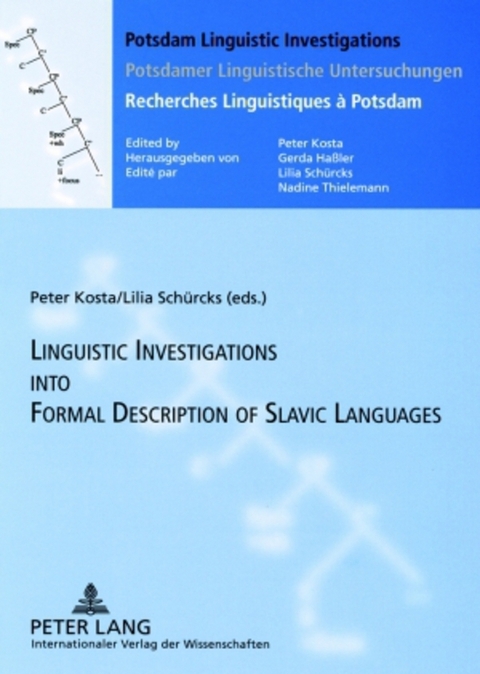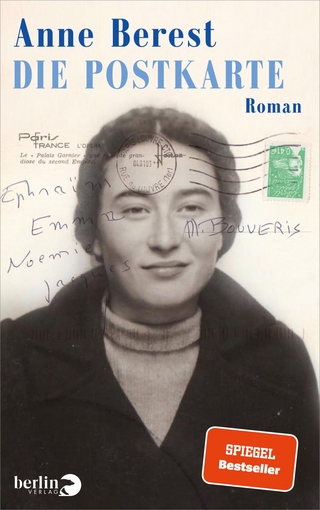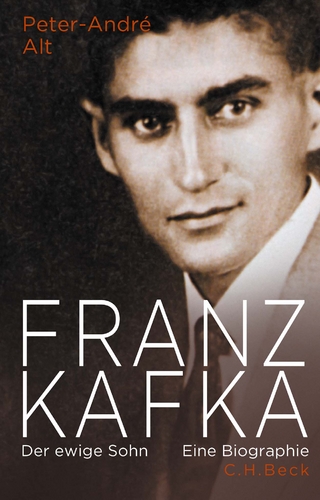
Linguistics Investigations into Formal Description of Slavic Languages
Peter Lang Gmbh, Internationaler Verlag Der Wissenschaften
978-3-631-55376-3 (ISBN)
The Editors: Peter Kosta is Professor of Slavic Linguistics and Chair at the Slavic Department at Potsdam University. His focus of research is syntax theory, semantics and discourse analysis. Lilia Schürcks, Ph.D., is Assistant of Slavic Linguistics in Potsdam. Her major areas of research are syntax theory, morphology and information structure.
lt;i>Contents: Malgorzata Cavar: Derived Environment Effects in A-Surface-Oriented Theory - Olivier Rizzolo: Utrovacki and Satrovacki: Description and Theoretical Perspectives of Two Serbo-Croatian Language Games - Valja Werkmann/Ina Mleinek: Russian Personal Pronouns and the Syntax-Phonology Interface - Johanka Dolezalová/Vladimír Petkevic: Shallow Parsing of Czech Sentence Based on Correct Morphological Disambiguation - Agnieszka Mykowiecka/Malgorzata Marciniak: Automatic Spelling Correction of the Texts from a Restricted Domain - Anna Kijak: Default Stress in Russian - Evidence from Second Language Acquisition. The Case of Russian Learners of Polish - Maria Yudina/Olga Fedorova/Igor Yanovich: Relative Clause Attachment in Russian: the Role of Conceptual and Grammatical Gender - Monika Basic: Split Phrases in Slavic - Petr Biskup: Phase Featuring-Driven EPP-Features and EPP-Feature-Driven Subjacency in Czech - Joanna Blaszczak: The NOM/GEN «Subject» Puzzle in Polish - Anna Bondaruk: Restructuring in Polish - a Phase-Based Analysis - Zeljko Boskovic: A Note on Wh-Typology - Bostjan Dvorák/Ilse Zimmermann: The Slovenian Imperative in Embedded Clauses - Jacopo Garzonio: The Subject Position in Russian Impersonal Sentences: a Cartographical Approach - Martina Gracanin-Yuksek: Croatian Free Relatives - Gasper Ilc/Milena Milojevic Sheppard: Slovene Negative Pronouns as N-Words - Olga Kagan: A Modal Analysis of Genitive Case in Russian - Olga Khomitsevich/Eric Reuland: On the Encoding of Temporal Dependencies - Peter Kosta/Lilia Schürcks: The Focus Feature Revisited - Nerea Madariaga: Russian Patterns of Floating Quantification: (Non-)Agreeing Quantifiers - Krzysztof Migdalski: Interaction between Verb Movement and Negation in South Slavic - Natasa Mili evi : When Negation is not Negation - Alexandr Rosen: Hybrid Agreement in Czech Predicates - Hana Skrabalova: Number Agreement with Coordinate Nouns in Czech - Nikolay Slavkov: Clitics and Argument Position: Evidence for the Double Object Construction in Bulgarian - Szymon Slodowicz: Inherent and Structural Control in Polish - Barbara Sonnenhauser: Perfectivity, Terminativity Boundedness: Aspect and Aorist/Imperfect in Bulgarian - Luka Szucsich: (Non)Agreement, Case Licensing and Argument Structure: Little v in Slavic Languages - Jovka Tisheva: On Right Dislocation and Marginalization in Bulgarian - Olga Miseska Tomic: Clitic-Doubling Strategies in Balkan Slavic - Helen Trugman: Rudiments of Romance N-to-D Movement in Russian - Jesse Tseng/Anna Kupsc: A Cross-Linguistic Approach to Slavic Past Tense and Conditional Constructions Principle - Valja Werkmann: Control and Raising in Bulgarian and Macedonian - Jacek Witkos: Polish and A-Type Scrambling - Markéta Ziková/Pavel Caha: The Czech Declension and Syncretism - Rositsa Dekova: Formal Description of Verb Meaning across Languages - Philip Dudchuk: Instrument/Subject Alternation and Event Structure: Evidence from Russian - Alte Grønn: Relative Past and the Syntax-Semantics Interface in Russian - Sergej Tatevosov: Measuring Individuals, Partitioning Events: Semantics of Cumulative Verbs in Russian - Beata Trawinski: Towards a Systematic Treatment of Polish Third Person Personal Pronouns - Bozena Rozwadowska: Various Faces of the Psych-Phenomenon in Polish.
| Erscheint lt. Verlag | 21.8.2007 |
|---|---|
| Reihe/Serie | Potsdam Linguistic Investigations ; 1 |
| Verlagsort | Berlin |
| Sprache | englisch |
| Maße | 148 x 210 mm |
| Gewicht | 750 g |
| Themenwelt | Geisteswissenschaften ► Sprach- / Literaturwissenschaft ► Literaturwissenschaft |
| Geisteswissenschaften ► Sprach- / Literaturwissenschaft ► Slavistik | |
| Geisteswissenschaften ► Sprach- / Literaturwissenschaft ► Sprachwissenschaft | |
| Schlagworte | 2005 • Computerlinguistik • Conference • Contributions • december • Description • European • formal • Formale Linguistik • Formale Syntax • Hardcover, Softcover / Slawische Sprachwissenschaft, Literaturwissenschaft • HC/Slawische Sprachwissenschaft, Literaturwissenschaft • Held • into • Investigations • Kongress • Kosta • Languages • Lilia • Linguistic • Linguistics • November • Optimalitätstheorie • Peter • Potsdam • Potsdam (2005) • Psycholinguistik • Schürcks • sixth • Slavic • Slawische Sprachen • University |
| ISBN-10 | 3-631-55376-5 / 3631553765 |
| ISBN-13 | 978-3-631-55376-3 / 9783631553763 |
| Zustand | Neuware |
| Haben Sie eine Frage zum Produkt? |
aus dem Bereich


